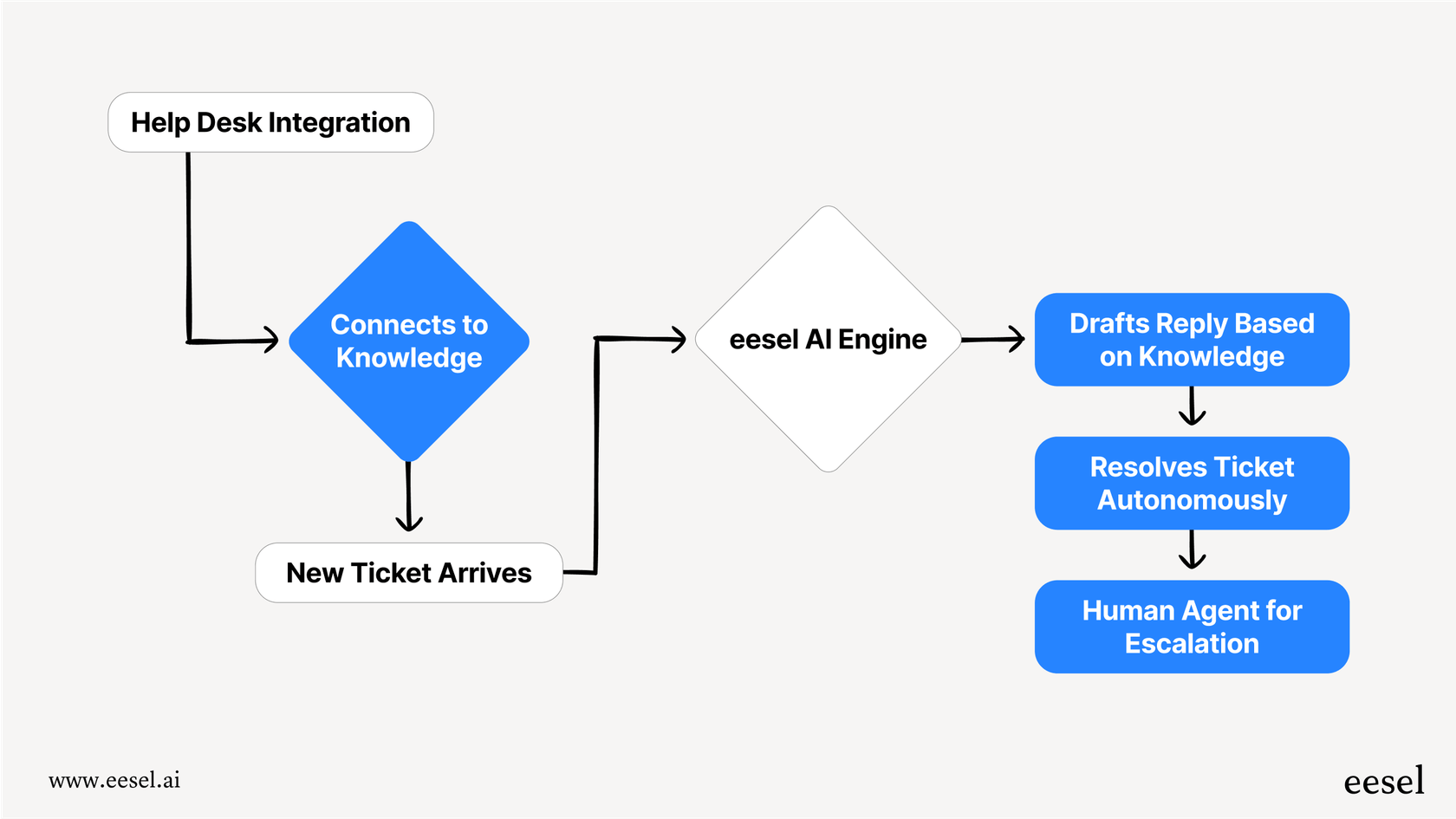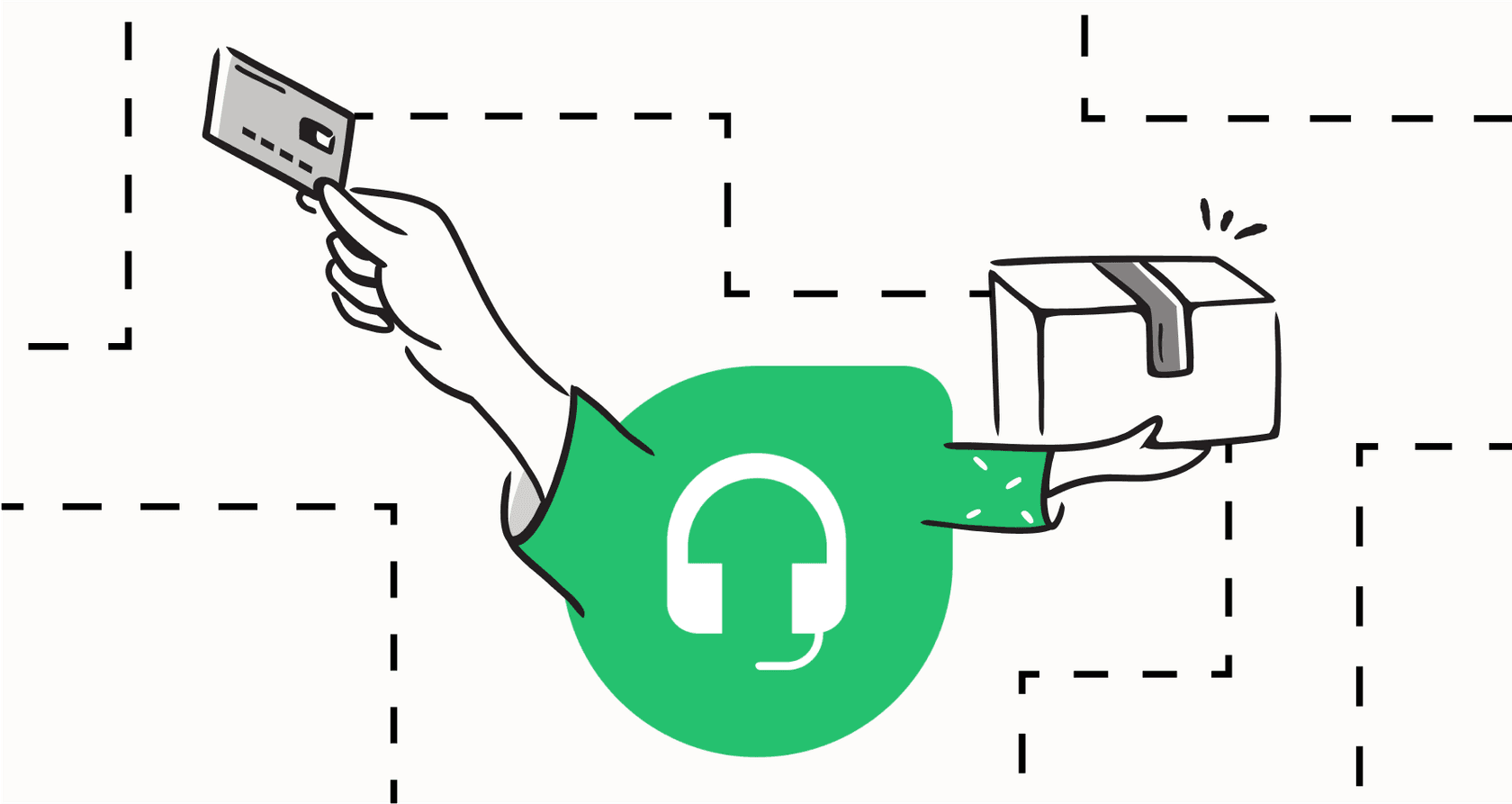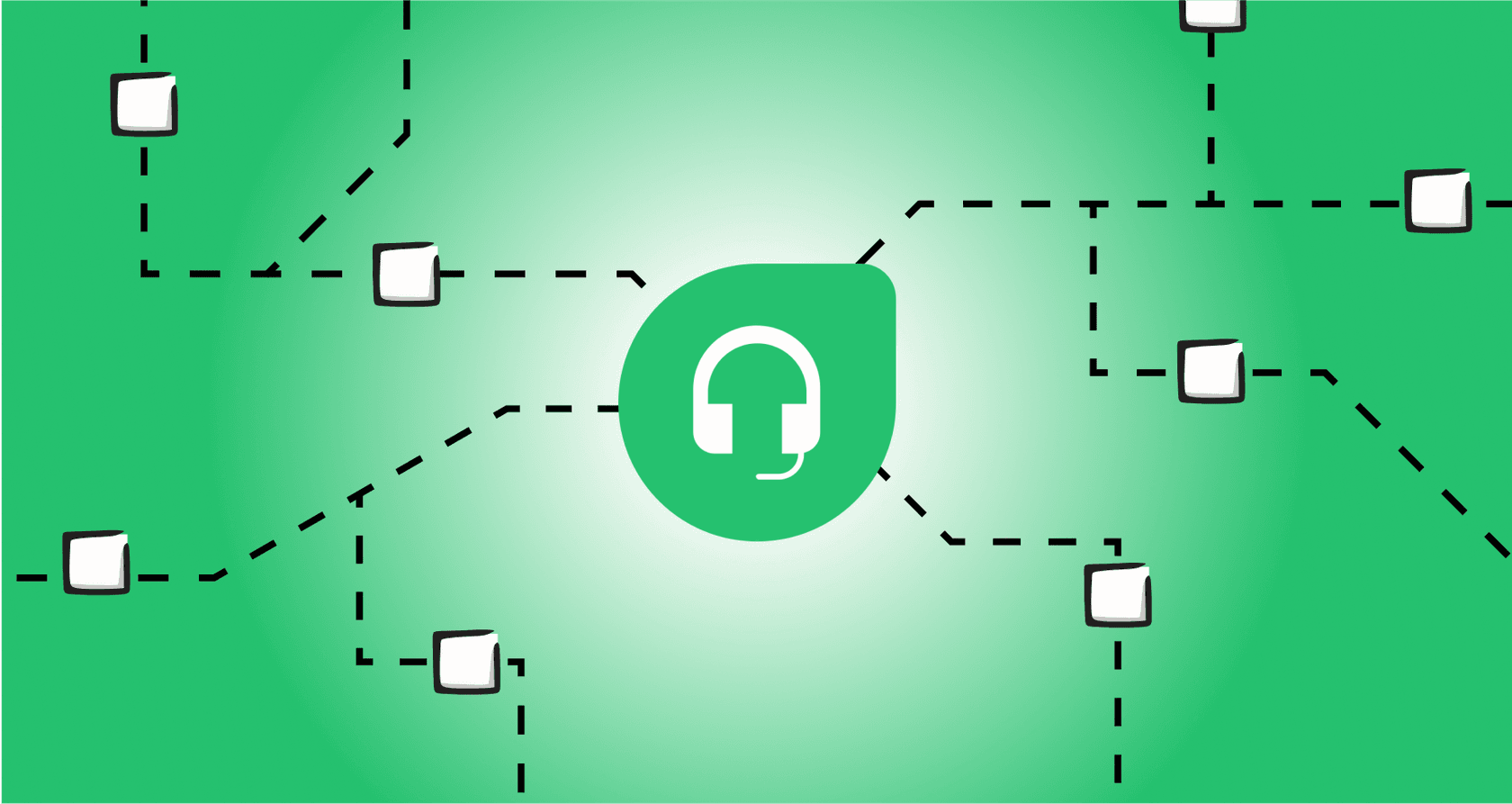GigaML vs Freshdesk: Choosing your AI customer support platform in 2026

Kenneth Pangan

Stanley Nicholas
Last edited January 16, 2026
Expert Verified

Deciding between a dedicated AI platform like GigaML and an AI-enhanced helpdesk like Freshdesk? We'll break down the two and introduce another helpful option.
Picking the right AI for your support team can feel like you're caught between two very different worlds. On one hand, you have powerful, specialized AI platforms that promise to build custom autonomous agents from scratch. On the other, you have the familiar all-in-one helpdesk that’s recently added some new AI features. It’s a classic head-scratcher.
This brings us to the heart of the GigaML vs Freshdesk debate. You’ve got Giga, an enterprise-level, AI-first platform built specifically for complex, high-volume support automation. And then you have Freshdesk, the well-known, user-friendly helpdesk that millions of teams already use, now equipped with its own powerful AI toolkit.
This isn’t just about comparing a checklist of features. It’s about two completely different philosophies on customer service automation. This guide will walk you through their core functions, features, pricing, and setup to help you decide which route makes the most sense for your team.
What is GigaML?
GigaML is an AI-native platform with one main goal: to let you create highly customized, autonomous support agents. Think of it as a factory for building digital employees who can handle complicated conversational workflows, especially over the phone and via chat.
Its main appeal lies in deep customization and control. The platform gives you an "Agent Canvas" for visually building an agent's logic, "Smart Insights" to analyze performance, and a "Natural Voice Experience" that aims for surprisingly human-like phone calls.
This level of detail means GigaML is aimed at huge enterprises, like their flagship customer DoorDash, that need to solve very specific, complex support issues and have the technical folks on hand to manage a custom, high-touch setup.
What is Freshdesk?
Freshdesk is a name most people in customer service know and trust. It’s a robust, all-in-one helpdesk that gives teams a single place to manage customer conversations from pretty much anywhere, be it email, chat, or social media.
Its strengths have always been its omnichannel ticketing system, a reliable knowledge base builder, and comprehensive reporting. To stay at the forefront, Freshdesk rolled out its own native AI, "Freddy AI." Freddy works as a set of features built directly into the helpdesk. It's designed to help human agents by automating routine tasks, suggesting replies, and powering efficient chatbots.
Freshdesk is for businesses of all sizes that want a comprehensive, easy-to-use helpdesk and are looking to try out AI within a proven framework. You can also boost its capabilities by connecting a more powerful AI layer, like the eesel AI Freshdesk integration.
Core GigaML vs Freshdesk differences: AI platform vs AI-enhanced helpdesk
The choice between GigaML and Freshdesk is really a question of strategy. Are you trying to build a new, separate AI workforce, or do you want to make your current team more efficient within a trusted platform?
GigaML's specialist AI agent approach
GigaML is all about building an autonomous workforce. Its agents are designed to handle entire conversations from start to finish, acting almost independently of your human team.
But all that power comes with a pretty big catch: complexity. Getting GigaML up and running isn't a weekend project. It often demands a significant mindset shift where it becomes a new, central piece of your support stack. At a minimum, you’re looking at a long, sales-led implementation that will probably involve your developers and data scientists. It's not a tool you can just sign up for and test out in an afternoon.
Freshdesk's integrated assistant approach
Freshdesk takes a user-centric tack. Its AI is there to help your existing human team, providing support that makes their day easier. The features live inside the helpdesk environment your agents already know, helping them close tickets faster and automate routine processes.
This integration means Freddy AI is perfectly tuned to the Freshdesk ecosystem. It focuses on the information within your helpdesk to provide consistent and reliable assistance. The automation rules are highly effective at resolving frequent questions, ensuring a consistent customer experience across your support channels.
A third way beyond GigaML vs Freshdesk: The flexible AI layer
This is where a tool like eesel AI comes in. It acts as a bridge between these two worlds, giving you the power of a specialized AI agent while working alongside the Freshdesk helpdesk you already use.
With eesel AI, you can plug a powerful, autonomous agent directly into Freshdesk. It learns from all your existing knowledge, whether that's past tickets, help center articles, or documents scattered across your company. The best part? You can get it set up and running simulations in minutes, not months.

Feature comparison: GigaML vs Freshdesk
Let's put them side-by-side and see how they really compare on the features that matter.
| Feature | GigaML | Freshdesk |
|---|---|---|
| Primary Function | Autonomous AI Agent Platform | All-in-One Helpdesk |
| AI Customization | High (Full control via Agent Canvas) | Medium (Pre-built bots & workflows) |
| Setup & Onboarding | High-touch, sales-led, months | Streamlined core setup, easy AI configuration |
| Knowledge Sources | Transcripts, uploaded documents | Robust Freshdesk knowledge base & tickets |
| Key Use Case | Complex, voice-first automation | Ticketing efficiency & agent assistance |
| Voice Support | Advanced, core feature | Reliable, often through marketplace integrations |
Where GigaML excels: Unmatched complexity and voice
GigaML's biggest strength is handling tricky, multi-turn voice conversations. If your support is mostly phone-based and involves complex logic (think insurance claims or changing travel bookings), GigaML’s Agent Canvas gives you the fine-grained control to build an agent that can handle it. This is for the enterprise with unique workflows and the budget to match.
Where Freshdesk excels: Simplicity and unification
Freshdesk's advantage is its all-in-one design. Your ticketing, knowledge base, and capable AI features all live under one roof. For teams that want a single solution that just works, it's a solid, reliable choice. The setup is simple, and your agents don't have to learn a new tool to get a bit of AI assistance.
The eesel AI advantage: Power meets practicality
eesel AI offers a compelling alternative. It delivers a fully customizable workflow engine that’s powerful enough for complex tasks but comes in a refreshingly self-serve package that works with Freshdesk.
-
You're in the driver's seat: You don't need a developer to define your AI's personality and actions. The visual prompt editor lets you control the tone of voice and connect AI Actions to look up order information or update ticket fields in real time.
-
Give your AI a complete brain: Why limit your AI to just one source of truth? eesel AI connects to your helpdesk, but it also pulls knowledge from Confluence, Google Docs, Notion, and over 100 other sources. This gives your agent a complete picture.

Pricing and setup: GigaML vs Freshdesk
For most teams, the decision boils down to budget and how quickly you can see results. This is where the differences between GigaML and Freshdesk become crystal clear.
GigaML's pricing: The enterprise "contact us" model
GigaML doesn't have a public pricing page. The only way to find out what it costs is to click the "Talk to us" button and get on the phone with their sales team.
This tells you a couple of things. First, it's designed as a high-value enterprise investment. Second, it means you're in for a focused sales cycle. You'll work closely with their team to see if the custom solution fits your specific requirements.
Freshdesk's pricing: Transparent, tiered pricing
Freshdesk offers clear, public pricing for its Support Desk product, which makes it easy to get started. Here are their plans for 2026:
-
Free: Up to 10 agents, includes basic ticketing and a knowledge base.
-
Growth: $15 per agent/month (billed annually), adds automation and collision detection.
-
Pro: $49 per agent/month (billed annually), adds custom roles and round-robin routing.
-
Enterprise: $79 per agent/month (billed annually), adds skill-based routing and a sandbox environment.
It’s worth noting that Freshdesk offers a variety of advanced Freddy AI features as add-ons. This gives teams the flexibility to choose only the capabilities they need as they grow, allowing you to scale your AI investment alongside your team's success.
eesel AI's pricing: Predictable pricing, no surprises
eesel AI’s transparent pricing is a breath of fresh air. Plans are based on the features and capacity you need, and you’ll never see per-resolution fees that penalize you for being busy.
The Business Plan, for example, is $639 per month (billed annually) and includes unlimited bots, the ability to train on past tickets, and custom AI Actions to connect to your other systems. This transparency lets you actually forecast your budget accurately.

Even better, eesel AI offers a powerful simulation mode. It's a unique feature that lets you test your AI setup on thousands of your historical tickets in a safe environment. You can see exactly how it would have performed and get a real forecast on resolution rates and cost savings before you go live or even commit to a paid plan.

The third option beyond GigaML vs Freshdesk: A flexible AI layer for your existing tools
So, what's the verdict? The GigaML vs Freshdesk debate presents a common dilemma. GigaML is incredibly powerful for custom builds, while Freshdesk is a reliable and familiar platform with strong built-in AI capabilities.
eesel AI solves this by giving you a third option. It’s an intelligent AI layer that plugs directly into the helpdesk you already use, whether that’s Freshdesk, Zendesk, or Intercom.
-
Go live in minutes: A one-click integration means you can have an AI agent running simulations on your actual ticket data the same day you sign up.
-
Unify all knowledge: Connect your AI to the tools your team actually uses, like Slack and Notion, to give it the context it needs to provide smart, accurate answers.
-
Test with confidence: Use the simulation engine to prove the value of automation and build trust with your team before a single customer ever talks to your AI.
GigaML vs Freshdesk: Making the right choice for your team
Ultimately, the right tool depends on your team's needs, resources, and long-term goals.
-
GigaML is for: Massive enterprises with dedicated developer teams who need to build a custom, voice-focused AI agent from the ground up as a standalone project.
-
Freshdesk is for: Teams who want a trusted, all-in-one helpdesk and value the built-in AI tools for agent assistance and efficient automation within a unified platform.
-
eesel AI is for: Smart, efficient teams who like their current helpdesk but want to add a layer of powerful, customizable AI automation on top of it.
Ready to see how a flexible AI layer can transform your support without the headache? Try eesel AI for free and run your first simulation in minutes.
Frequently asked questions
GigaML is an AI-native platform designed to build autonomous agents for complex support, aiming to handle interactions independently. Freshdesk is a robust, industry-leading helpdesk with integrated AI features that primarily assist human agents with routine tasks and efficiency. The core distinction is an autonomous workforce versus an integrated assistant.
GigaML is primarily for large enterprises with complex, high-volume, often voice-first support needs and the technical resources for deep customization. Freshdesk suits businesses of all sizes seeking a capable, all-in-one helpdesk for managing various customer conversations with the power of native AI assistance.
Implementing GigaML typically involves a high-touch, sales-led process, often requiring developer and data scientist involvement for a custom setup. Freshdesk offers a more streamlined core setup, allowing teams to get up and running quickly with its intuitive interface and powerful AI features.
GigaML excels in building highly customized, multi-turn conversational agents that learn from transcripts and uploaded documents. Freshdesk's Freddy AI focuses on agent assistance and specialized chatbots, learning from its internal knowledge base and tickets to provide deep context for customer support interactions.
GigaML uses an enterprise "contact us" pricing model, indicating a tailored, custom cost structure. Freshdesk offers clear, tiered public pricing for its helpdesk, making it easy for teams to understand their investment, with advanced AI features available as flexible add-ons.
The flexible AI layer, like eesel AI, offers the power of a specialized AI agent that works within the Freshdesk ecosystem. It allows for rapid deployment, connects to over 100 knowledge sources beyond just your helpdesk, and enables robust simulations to prove value before going live.
Share this post

Article by
Kenneth Pangan
Writer and marketer for over ten years, Kenneth Pangan splits his time between history, politics, and art with plenty of interruptions from his dogs demanding attention.





